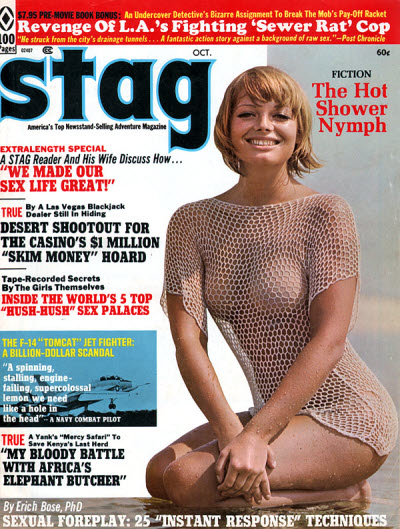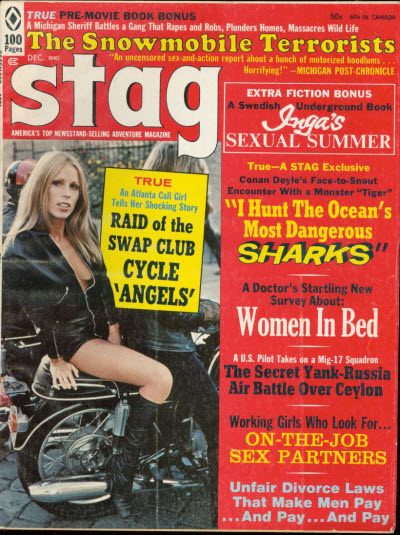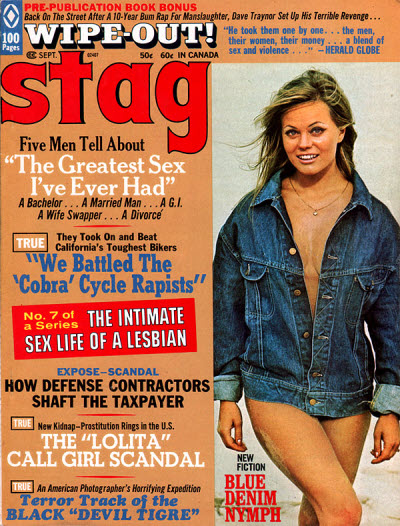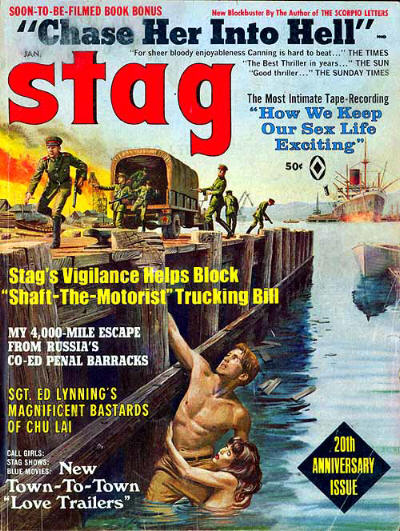 |
On June 29th, 2012, this blog was born. Today, I celebrate my first anniversary as a blogger. Two big thanks are in order here. First, thanks to my lovely wife Judy who set this blog up for me as a surprise. I came home from work one day and she said "guess what you have now?" I was genuinely but pleasantly surprised. I most likely would have never done this without her support and encouragement. Thanks honey, you're the best! Thanks also to each and every one of you who have taken the time to visit this blog and read my posts. As of this morning, I've had 28,508 hits which is not bad. I hope that you've enjoyed reading about the stuff that interests me and hopefully, interests you. Is there anything you'd like to see more of? Less of? Something I haven't written about? Something you wish I'd never write about again? Please let me know. Your feedback and comments are always welcome and appreciated. In honor of this first anniversary, I've been going back to the beginning of the blog and adding a new coat of paint to some of my early postings. I must admit that I didn't really know what I was doing when I started this endeavor. I learned by doing and made some mistakes along the way but I've definitely made the blog better now than when I started. If you're a regular reader or a first timer, you might want to go into the archives and read some of the "new" old posts. Finally, a word from our sponsor. I sell lots of the stuff I write about here on my blog on eBay. I sell DVDs, comic books, magazines, books (hardcover and paperback) and graphic novels. My eBay seller i.d. is: member287992. Check it out and bid on anything that strikes your interest. I'd love to sell some of my stuff to someone who reads this blog. Also, I have a list of comic books for sale/trade that I'd be happy to send to anyone who's interested. Email me at docsavag@austin.rr.com and ask and I'll send you the list. Thanks again to one and all. Someone once said that a writer only starts the story. It's the readers who finish it. It's been a great first year and I hope the second year is even bigger and better. Keep reading and I'll keep blogging. |
Saturday, June 29, 2013
ONE YEAR AGO TODAY
Friday, June 28, 2013
A RED SUN ALSO RISES
I finished reading A RED SUN ALSO RISES (2012) by British science fiction author Mark Hodder the other day. It's the first book by Hodder I've read but it won't be the last. RED SUN is a steam-punk "sword and planet" story in which a British vicar and his female sexton are sent as missionaries from Victorian London to a remote island in the South Pacific. The natives practice cannibalistic rituals and sacrifices and guess who's on the menu? But before Aiden Fleischer and Clarissa Stark can be offered up to the dark gods, a space/time portal opens up above the island and transports the duo to a distant planet. Aiden is suffering from a crisis of faith and is not sure if he's responsible for the Jack the Ripper murders back on earth (he's not). Clarissa, whose body was horribly deformed on earth, is cured of her crippling injuries on the alien world and emerges as a stunning beauty (of course). The natives of the planet are mimetic. They collectively scan Clarissa's mind and, based on what they find there, recreate Victorian London on their world in a matter of days. But the twin suns are about to set and the red giant is about to rise and with the dawn come the Blood Gods. There's more, much more including revelations about the true nature of the aliens and imprisonment and escape from a massive crystalline island. The real villain is finally revealed along with his nefarious scheme and it's up to Aiden, Clarissa and their alien allies to turn back the invasion of our world. The climatic battle is quite cinematic and the weapons used are an intriguing mix of steam punk tanks and airships. Our heroes win the day but Aiden is transported back to earth where World War II is now being waged. While voyaging back to England his ship is sunk by a Nazi submarine and he loses the crystal that will facilitate his return to Clarissa and his new found home planet. But fear not for Aiden Fleischer. He won't have trouble finding his missing crystal for it seems there are some mighty strange things happening in a triangular portion of the Atlantic Ocean near Bermuda. To be continued... A RED SUN ALSO RISES is squarely in the tradition of Edgar Rice Burroughs' A PRINCESS OF MARS, the first novel in his John Carter of Mars series. It takes a while to get going and there's a lot of travelogue type narration describing the alien world and its' inhabitants. The story picks up steam (pun intended) about halfway through and the climax is a thrilling page-turner with vividly described action set pieces. I enjoyed RED SUN and look forward to reading the further adventures of Aiden and Clarissa. Recommended. |
Thursday, June 27, 2013
DARK PASSAGE
I watched DARK PASSAGE (1947) the other night. I recorded it off of TCM. It's a good film noir that I'd never seen before and it's one of four films that Humphrey Bogart and Lauren Bacall made together. The other films include THE BIG SLEEP, TO HAVE AND HAVE NOT and KEY LARGO. DARK PASSAGE, uses a unique narrative conceit for the first act of the film. Almost everything we see is shot from the subjective point-of-view of Bogart who plays an innocent man framed and convicted of his wife's murder. He escapes from prison at the beginning of the film and is determined to find his wife's real killer and clear his name. Does that set-up sound familiar? David Goodis, who wrote the novel this film was based on, filed suit many years later against the producers of the television series THE FUGITIVE, claiming that series stole from his work. With everything seen from Bogart's p.o.v, we don't see the actor's familiar face until after he's had plastic surgery and emerges with a new face in the second act of the film. For an actor of Bogart's stature, this was a pretty bold move to star in a film in which he doesn't appear on screen for almost a third of the movie. Bogart is aided in his search for the truth by Lauren Bacall, a wealthy young artist whose own father was also wrongly convicted for a crime he didn't commit. Bogart encounters a two-bit crook who is wise to the truth and tries to blackmail Bogie. The crook meets an unfortunate, albeit accidental, demise. Bogart finally confronts his wife's real killer but that person also takes a fall from a great height leaving Bogart even more desperate and wanted by the police. He engineers an escape plan to South America and tells Bacall to meet him there whenever she can. She does and the film ends with the couple reunited (and on the lam) in Peru. Directed by Delmer Daves, DARK PASSAGE is a tight, compelling noir thriller that is well worth seeing. Bogart and Bacall are always fun to watch together and the point-of-view gimmick is actually fairly well executed. Recommended. |
Wednesday, June 26, 2013
VICE RAID
 |
Despite the slightly lurid title and the presence of the va-va-va-voom Mamie Van Doren, VICE RAID (1960), is about as average a crime film as you're ever likely to find. TCM ran several Van Doren films the other night and, on a whim, I recorded some of them. I watched VICE RAID the other day and I can't recommend it to anyone who's not a hardcore Van Doren fan. Mamie Van Doren was a platinum blond Marilyn Monroe wanna-be who had a short film career in the 1950s and '60s. Van Doren was never a big star and she only played bit parts in the major films in which she appeared. When she was a headliner, as in VICE RAID, the results were watchable but far from spectacular. In fact, the most spectacular thing (or things) about VICE RAID is Van Doren herself (if you know what I mean and I think you do). In the film, organized crime boss Brad Dexter (who was, as you'll recall, one of the Magnificent Seven and if you don't remember that factoid, please go back and read my blog post on that film) uses "model" (that's code for prostitute) Van Doren to frame vice detective Richard Coogan. As a result of the set-up, Coogan is fired from the force. He swears vengeance against the racket and Van Doren eventually comes to his aid after her sister is brutally assaulted and raped by Dexter's right-hand man, Barry Atwater (he played the Las Vegas vampire in the classic made-for-television film THE NIGHT STALKER). Coogan and Van Doren work with the police to get the goods on Dexter and the mob, Coogan gets his job back on the force and Van Doren and her kid sister leave the big city to return to their small hometown. The end. Interior scenes in VICE RAID appear to have been shot on only a couple of re-dressed sets and the exteriors were all filmed on the back lot. The cast is okay and they do their best with what they're given to work with which isn't much. VICE RAID isn't dark enough to be a noir and it's not so-bad-it's-good to be a cult film. It's a passable, routine crime film worth seeing for only one reason. Make that two reasons. |
Tuesday, June 25, 2013
"TAKE ME HOME LITTLE BOY, YOU WILL LOVE ME!"
Pictured above is the box art for the Creature from the Black Lagoon Aurora plastic model kit. The cover art, as I learned just a few years ago, is by the incomparable James Bama. Bama did many striking paperback cover for Bantam Books and among his best and most well-known works are the cover paintings he did for Bantam's Doc Savage series, which reprinted the vintage pulp novels in paperback format. Bama did the cover art for many of the first generation of Aurora monster model kits and it was his work on the Creature box art that grabbed me by the throat (metaphorically speaking, of course) when I was a very young boy. The time was the early 1960s, the place, Fort Worth, Texas, where my family had been relocated for a couple of years due to my dad's work. I was in either kindergarten or (most likely) first grade, when I saw a display of Aurora monster model kits in a variety/department store. I had no idea who James Bama was (although he would become one of my all-time favorite artists). What's more, I had no idea who or what "the Creature" was. I had no knowledge of the film whatsoever at that young age and I didn't see the classic monster movie for the first time until many years later. All I knew was that this image, this monster, was one of the coolest things I had ever seen and I simply had to have it. My father, who also loved old monster movies, indulged me and bought the kit, along with a tube of glue, some little bottles of model paint and a couple of brushes. As soon as we got home, the building of this fabulous monster model kit began. Having never built a model kit before, my father did the majority of the work while I merely watched in wonder and awe. When he was finished and all of the pieces were properly painted and the paint was dry, he began gluing the pieces together. It was an agonizingly slow process but the finished product was well worth the wait. I now owned my very first ever monster model. I had to have another and I did. Over the next few years, I managed to purchase and build almost every Aurora monster model kit on the market. I quickly became proficient at kit painting and building by myself, a skill I had to master when my dad passed away in 1965. I never kept the original boxes once the kits were assembled and, as I've related elsewhere on this blog, all of my monster models met destructive demises. The finished Creature kit looked like this:  One of these days, I plan to purchase one of the reproductions of the kit that are currently available. They're exact replicas in every way including the original box art and graphics. While it would be even better to own an original unbuilt kit in the original box, the prices that those treasures are fetching are beyond me. I'll settle for a nice copy at a decent price and throw in the priceless memories for free. |
Thursday, June 20, 2013
KIDS, DON'T TRY THIS AT HOME
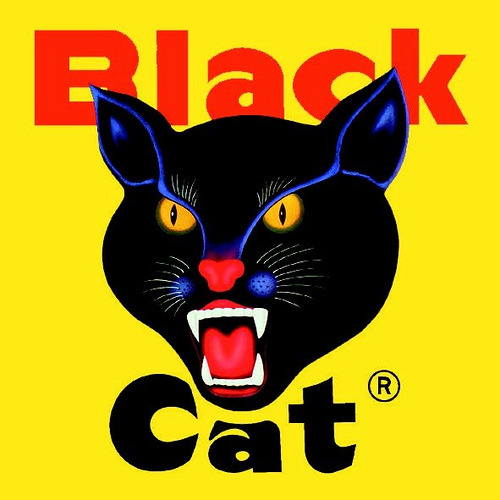 |
In yesterday's blog post, I wrote about how, as kids, we used to regularly blow up our plastic models with firecrackers, lighter fluid and matches on a regular basis. All of us kids had a stash of Black Cat firecrackers squirreled away somewhere in our closets. Those firecrackers used to be much easier to come by back in the 1960s. We didn't have to wait for the 4th of July or New Year's Eve to purchase them and there were no ordinances banning the use of fireworks in the city limits. Still, I'll be the first to admit that while the destructive, pyrotechnical practices we indulged in on a regular basis were and are dangerous things to do, none of us young miscreants were ever seriously hurt while doing this, nor did we ever cause any property damage (except the loss of our models). And none of us grew up to be arsonists, terrorists or other threats to society. You must remember that this was fifty years ago and the world was a radically different place. Safety gear? Didn't exist. Adult supervision? Are you kidding? As kids, we regularly engaged in various dangerous practices (almost all of which could have ended very badly) but we came through all of these adventures in one piece. And most importantly of all, we had fun doing it. We rode our bikes all over hell-and-creation without bicycle helmets or any other safety gear. There were certain streets I was not allowed to ride on but I regularly rode to my friends' houses and to the neighborhood 7-11 to buy comic books. During elementary school at Brykerwoods, a bunch of us boys would gather on the playground after school, choose up sides and play either tackle football (in the fall) or baseball (in the spring). The only equipment we had were a football, a couple of baseballs and a few bats. Every kid had a baseball glove. There was no protective gear, no referees, umpires or adults. Everybody played and everybody had a good time. No one, that I can recall, was ever seriously injured. We'd go home with a skinned up knee or elbow and our clothes would be filthy but we were uninjured. On Saturday afternoons, we'd hop a city bus and ride to downtown Austin to see a movie at the Paramount or the State Theaters and afterwards, we'd go to the soda fountain in the basement of Woolworth's or goof around in Seniors' Discount store (they had amazing novelty items) until it was time to get on a bus and go home. There was no such thing as a "play date". If you wanted to play with a friend you rode your bike (or walked) to his house, rang the doorbell and when he came to the door you'd ask "want to play?" In the summers, we'd play some kind of crazy ass game in the street until it was dark enough for the streetlight to come on. That's when we knew it was time to head for home. We regularly played along the banks of Shoal Creek which ran near my street. There were no homeless encampments then, just us kids playing "army" or "spies" or whatever. But 2013 is a vastly different world than 1965 and I must caution my readers (especially the youngsters, if there are any), not to do as I did when I was kid and blow up your monster models with firecrackers. In fact, almost all of the activities listed above are most likely forbidden (or greatly frowned upon) in today's world. I did all of these things and survived but I certainly don't want to be seen as an advocate of unsafe and dangerous activities. But boy, did we have fun. |
Wednesday, June 19, 2013
MY FAMOUS MONSTERS 6
  |
Lots of great stuff in issue #32 which came out in March, 1965. That's my birthday month and I was nine-years old when I first bought this issue of FAMOUS MONSTERS. I sold it/traded it/lost it somewhere over the years but I do have a copy of it in my current collection. The cover image is one of the winners of the big Aurora/FAMOUS MONSTERS/ Universal Pictures Master Monster Maker contest. This was a competition for FM readers to go to town on customizing their Aurora monster models (or "all-plastic-assembly-kits" as they were technically referred to). Readers were asked to customize their models and send in photos of their work. The cover image, of King Kong on a rampage, is very nicely done and there are plenty of other great photos of the handiwork of "master monster makers" in this issue. I wish I could have been skilled enough to customize my monster models. I was a pretty good kit builder but I stuck to the parts that came in the box and the suggested paint schemes. My monster models looked good for the work of a kid but they were nothing spectacular. Of course, none of them survived my childhood. All of them, every last monster, met a fiery demise at the business end of Black Cat firecrackers, lighter fluid and matches (usually a combination of all three elements). I don't know why I was so eager to destroy something that had cost me money and time to assemble and I certainly enjoyed admiring the fruits of my labor. But at some point in time, I was compelled to get rid of them all in the most spectacular, pyrotechnical way I could safely engineer. And I wasn't alone. Every kid in the neighborhood contributed their models-monsters, cars, planes, etc. to community conflagrations over the years. I vividly recall stuffing a model of PT-109 (the patrol boat skippered by John F. Kennedy in WWII) with firecrackers, lighting the fuses and setting the small plastic boat afloat in a large puddle of water moments before it was blown to bits. That model had to be destroyed on the water. Other features in this issue of FM include a comic book adaptation of the Christopher Lee/Peter Cushing Hammer films masterpiece THE HORROR OF DRACULA, a first look at THE MUNSTERS television show, and THE HIDEOUS SUN DEMON (which reminds me, I have a story to relate about my near encounter with the film's star Robert Clarke for a future blog post). |
Tuesday, June 18, 2013
MY FAMOUS MONSTERS 5
 |
 |
FAMOUS MONSTERS #31 from December 1964. I had this one when I was a kid and I loved it. Great Karloff/Mummy cover art and tons of great features: details about the Aurora Monster Model contest, Lon Chaney Sr., The Monster Eye (previews of forthcoming horror/sf/fantasy films), Mexican movie monsters, Headlines from Horrorsville (a kinda-sorta monster newspaper), the ever-popular Mystery Photo and more. I read this one from cover to cover multiple times. |
Monday, June 17, 2013
MY FAMOUS MONSTERS 4
  |
From July, 1964, FM #29 sports a terrific cover spotlighting the then current film, THE FLESH EATERS. I had this issue when I was a kid and the idea that there was actually a movie out there called THE FLESH EATERS, creeped me out to no end. I didn't see the film until years later and it didn't hold up to my childhood imaginings but then, what does? Other features in this issue include Jerry Lewis attacked by monsters (article about the DC comic book THE ADVENTURES OF JERRY LEWIS, which was beginning to regularly feature a supporting cast of comic monsters), Christopher Lee, THE MOLE PEOPLE and THE 7 FACES OF DR. LAO. Nice balance of features, some featuring new films, others focusing on older ones. |
Saturday, June 15, 2013
MY FAMOUS MONSTERS 3
  |
FAMOUS MONSTERS #28 went on sale on March 1, 1964, the day before my eighth birthday. I never had this issue as a kid but I've got a copy now and it's a good one. Cover image is of Bela Lugosi from ISLAND OF LOST SOULS (a film I recently added to my DVD collection on the Criterion label). Features include the most exciting collection of horror photos in 7 years, Chaney's Phantom face unmasked and 2-Faced monsters! Great stuff! |
Thursday, June 13, 2013
MY FAMOUS MONSTERS 2
  |
Here's FAMOUS MONSTERS #27 with a terrific cover image of the Cyclops from the Ray Harryhausen masterpiece THE 7TH VOYAGE OF SINBAD. Articles include New Fears (a preview of upcoming horror films), Hidden Horrors, The Voice of Fiendom (an outlet for horror film fandom), the ever-popular Mystery Photo, the conclusion of the KING KONG filmbook and something entitled "Hall of Flame". This is another issue that I never had as a kid. I purchased it years later and I'm glad to have it. Forry would often run articles like New Fears, in which he would list allegedly upcoming horror, science fiction and fantasy films. Many of those films he listed in those articles were eventually produced and released. Many more never saw the light of day. What I figured out years later was that Forry listed both confirmed projects and properties that had only been optioned, which meant the film may or may not be produced. I didn't know anything about options at the time and I don't think Forry ever went into details about the option process. But I do know that Forry, in addition to being editor of FM was also a literary agent for a number of science fiction and horror authors. As such, I'm sure he negotiated many film options for his clients' works. As soon as such a deal was finalized, he would report it in the pages of FM without telling that the odds were 50/50 on the film actually ever being made. I always wondered whatever happened to some of the "upcoming" films I read about in the pages of FAMOUS MONSTERS that never saw the light of day. I believe the Forry as agent/option scenario is the answer to that question. And now you know the rest of the story. |
Wednesday, June 12, 2013
MY FAMOUS MONSTERS 1
 |
I know I promised postings of vintage detective/true crime magazines from my collection but I've decided to put that project on hold for the moment and instead post images of my all-time favorite magazine: FAMOUS MONSTERS OF FILMLAND. I hope to post a long piece in the future about my relationship with this magazine and it's longtime editor Forrest J. Ackerman. In a way, it's the story of every "monster kid" that ever lived. But it's my story and I want to tell it. Stay tuned. In the meantime, feast your eyes on this beauty, issue #23 from June 1963. This is the oldest issue of FM that I currently own and it's a great one. The cover image is, of course, from WAR OF THE COLOSSAL BEAST and the featured articles include an unusual Frankenstein photo, the final chapter of the SON OF KONG Filmbook (remember those?) and an interview with the one-and-only Boris Karloff. Great stuff! I never owned this issue of FM when I was a kid. It was published before I became a regular reader. I bought this one many years after the fact and I'm proud to own it. |
Tuesday, June 11, 2013
MY MEN'S ADVENTURE MAGAZINES 28
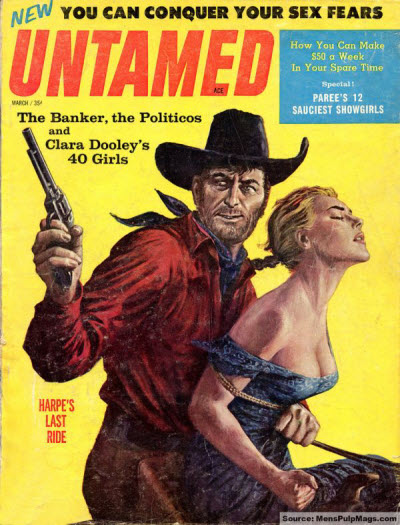 |
UNTAMED for March, 1960. Purchased at a City Wide Garage Sale. This is the last of the vintage men's adventure magazines that I have in my collection. Starting tomorrow, I'll be posting covers for some other cool old magazines that I have in my collection: detective/true crime mags. Stay tuned. |
Monday, June 10, 2013
MY MEN'S ADVENTURE MAGAZINES 27
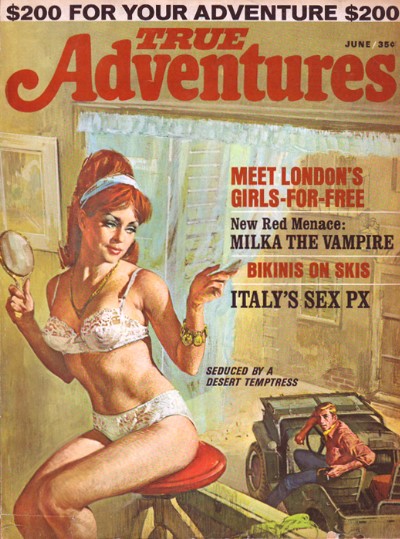 |
TRUE ADVENTURES, June 1965. Purchased at a 2013 City Wide Garage Sale. |
Saturday, June 8, 2013
AFTER THE GOLDEN AGE
 |
I finished reading AFTER THE GOLDEN AGE by Carrie Vaughn yesterday. It's a novel about super-heroes, a sub-genre of fantastic fiction that seems to be growing by leaps and bounds.
The novel is the story of one Celia West, a twenty-five year old accountant who just happens to be the daughter of two super-heroes: Captain Olympus and Spark. Her parents, along with The Bullet and Dr. Mentis, comprise The Olympiad, the crime-fighting team supreme of their city. Trouble is, Celia, unlike her parents, has no super powers whatsoever. She's constantly rebelling against them and seeks desperately to establish her own life, career and identity.
But being the child of super-powered public figures, Celia is the objective of constant kidnapping attempts. One of the most persistent threats comes at the hands of The Destructor, The Olympiad's arch-enemy. Celia finds herself a pawn in the deadly game played between the heroes and villains but she gets a chance to redeem herself and become a heroine in her own right when she begins to investigate the mysterious origins of all of these super folks (good and bad).
She finds some family secrets that are better left undisclosed and her actions lead to the death of one of the supporting players but Celia finally emerges from the shadows of her parents and stands as her own woman at last.
AFTER THE GOLDEN AGE is a quick read. The characters are well-drawn and there are enough plot twists and surprises to keep you guessing. It's well written but it's not spectacular prose. In short, it's a fun book for comic book fans who are looking for a new perspective on super-heroes. Thumbs up.
|
MY MEN'S ADVENTURE MAGAZINES 26
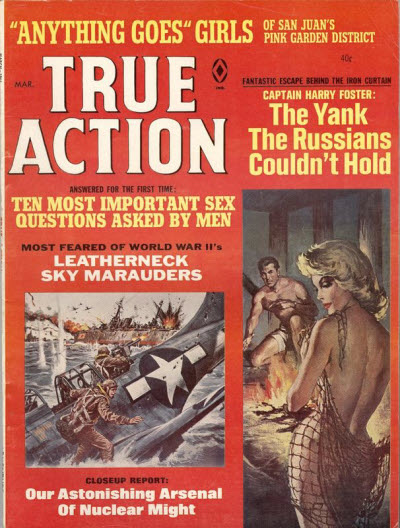 |
TRUE ACTION for March, 1966. Purchased at a 2012 City Wide Garage Sale. |
Friday, June 7, 2013
CAPTAIN BLOOD
 |
After seeing THE ADVENTURES OF ROBIN HOOD last weekend at the Paramount, I decided to watch another Errol Flynn film this week. This one, CAPTAIN BLOOD (1935) is the granddaddy of them all.
Based on the novel by Rafael Sabatini, CAPTAIN BLOOD is a glorious, old-fashioned swashbuckling adventure film. Flynn stars as the titular character, Dr. Peter Blood, who through trials and tribulations goes from being a man of medicine to a fearless pirate captain. This was Flynn's first starring role for Warner Brothers (he had appeared in bit parts in a few other films prior to this). He was a relative unknown at the time and the studio took a major gamble casting him in such a prominent role. The gamble paid off.
The story goes that Flynn was extremely nervous while shooting his first scenes under the direction of Michael Curtiz. But as the days went on, Flynn became more confident in his role and began to deliver an astonishingly assured performance. In fact, by the time the film was finished, Flynn was so good that several earlier scenes were re-shot to showcase Flynn's bravura performance.
Also in the cast was the lovely, 19-year-old Olivia de Havilland (also in her first big role). Flynn, de Havilland and Curtiz made a terrific team and they went on to make several classic adventure films together, including THE ADVENTURES OF ROBIN HOOD (1938).
Every good hero deserves a good villain and CAPTAIN BLOOD has two of them: Lionel Atwill and Basil Rathbone. Atwill is the evil governor of Jamaica who buys Flynn into slavery early in the film while Rathbone plays a treacherous French pirate with whom Flynn forms an uneasy alliance. When Rathbone disobeys Flynn's articles of piracy, swords are drawn. The two square off in a terrific sword fight staged on a rocky beach. Flynn and Rathbone also dueled to the death in ROBIN HOOD and Rathbone and Atwill co-starred in the Universal horror classic SON OF FRANKENSTEIN (1939).
CAPTAIN BLOOD is a terrific movie, full of political intrigue, romance, sea battles and flashing swords. It made an icon out of Errol Flynn and defined his film persona for the rest of his career. I think ROBIN HOOD is the slightly better film but CAPTAIN BLOOD is a solid piece of work that is still thrilling after 78 years. Highly recommended.
|
Thursday, June 6, 2013
THE LONGEST DAY
 |
"There's two kinds of men on this beach. The ones who have died and the ones who are going to die."
For many years I've had the notion of watching THE LONGEST DAY (1962) on June 6th. Today was the day I finally did it. I also hope to watch YANKEE DOODLE DANDY on July 4th and TORA! TORA! TORA! on December 7th this year. I'll let you know if I succeed.
Cornelius Ryan's historical account of D-Day, THE LONGEST DAY, became in instant bestseller when it was published in 1959 and the film version was produced in 1962, just eighteen years after the invasion of France. I didn't see the film when it was first released but I always had an urge to try and read the book when I was a youngster, even though I knew it would be a lot of material to absorb. I never did read the book (but I do have a copy of it on my WWII bookshelf) and I finally got around to seeing the film uncut (TCM?) on television several years ago. Today was the first time I'd watched the film since. It's a truly epic war movie, staggering in scope and attention to detail and historical accuracy. It tells the story of the Allied invasion of Normandy on June 6th, 1944 and it tells that story from both points of view: the Allies and the German high command. I like the fact that the scenes featuring German and French speaking actors and actresses are subtitled. It adds to the authenticity of the film.
With a running time of 178 minutes, THE LONGEST DAY is an almost minute-by-minute depiction of the invasion and it covers a lot of ground (literally and narratively). There are the British gliders that land behind enemy lines in the night, the U.S. paratroopers who land all over the place, the beach landings at Omaha, Utah, Gold-Juno and Pointe du Hoc, a daring French raid against a harbor town, etc. The action cuts back and forth from all of these theaters of combat (and scenes of confusion and incredulity at the German high command) skillfully and smoothly. There's never any confusion about where and when and with whom the various narrative threads are occurring. Credit for this masterful job of direction goes to several men: Ken Annakin (British and French exteriors), Andrew Marton (American exteriors), Gerd Oswald (parachute drop scene), Bernhard Wicki (German scenes) and producer Darryl F. Zanuck (uncredited). The action sequences are all extremely well staged and there are several sustained aerial tracking shots that are simply breathtaking.
The cast is comprised of all-star actors from both sides of the Atlantic and includes John Wayne, Henry Fonda, Robert Mitchum, Sean Connery, Eddie Albert, Curt Jurgens, Richard Burton, Peter Lawford, Rod Steiger, Gert Frobe, Edmond O'Brien, Robert Ryan, Robert Wagner, Fabian, Sal Mineo, Stuart Whitman, Steve Forrest and Kenneth More.
THE LONGEST DAY cost $7.75 million to produce and every penny of that budget is on the screen. With an unforgettable theme by Maurice Jarre, THE LONGEST DAY ranks as one of the greatest war movies ever made. I was thoroughly enthralled by this magnificent film and I strongly suggest that every American should see it at least once in his or her life. I shed a tear (more than one) at the end of this film. It's a stirring re-creation of a day in history in which the fate of the world hung in the balance and it's a tribute to the fighting men who paid the ultimate price in that battle. I hope I'm able to watch this movie every June 6th (if possible) for many years to come.
|
Wednesday, June 5, 2013
WALK ON THE WILDER SIDE
 |
I finally finished reading ON SUNSET BOULEVARD: THE LIFE AND TIMES OF BILLY WILDER by Ed Sikov last night. I've been reading it since the first of the year and the reason it took me so long to finish this 592 page biography of one of the greatest film directors of all-time is that I read the entire book aloud to my lovely wife, Judy. When you only have a few minutes to read each evening, when you're reading aloud, and the book you're reading is just south of 600 pages, it takes awhile.
I enjoyed the book. It covers all 25 feature films that Wilder directed, from THE MAJOR AND THE MINOR to BUDDY BUDDY, plus films he wrote in Hollywood and films he wrote and directed while still in Europe. As such, it's as comprehensive an overview of a great man's career and body of work as one could hope to read.
Billy Wilder, in addition to being a terrific writer and director, was also a consummate storyteller. Make that, bull-shit artist. He never told the same story twice and there are many things in his life and career that no one quite knows the exact truth about due to Wilder's mercurial gift of gab. It also turns out that the man could be an absolute prick to those around him. He was quick with the insult, the gibe, the wisecrack that, while funny, contained a well-sharpened barb.
Wilder's film making career can be divided into two distinct parts: the good films that he made up to a certain point and the string of bad films that he made for the rest of his career. The scales are balanced out over the years with DOUBLE INDEMNITY, THE LOST WEEKEND, SUNSET BOULEVARD, ACE IN THE HOLE, SOME LIKE IT HOT and THE APARTMENT offsetting the consecutive flops of KISS ME, STUPID, THE PRIVATE LIFE OF SHERLOCK HOLMES, AVANTI!, THE FRONT PAGE, FEDORA and BUDDY BUDDY.
It seems that Wilder lost his touch sometime in the early 1960s after winning Best Director and Best Picture Oscars for THE APARTMENT. ONE, TWO, THREE looks better in retrospect than it did at the time of release and while IRMA LA DOUCE was a commercial hit (reuniting Jack Lemmon and Shirley MacLaine), Wilder's subsequent films were all both critical and box-office failures. Even though he was out of touch with the "new Hollywood" of the 1960s and '70s, Wilder kept on working until he finally realized that he could longer produce the types of films he used to.
It's very tempting to see the later years of Billy Wilder as an analog for Norma Desmond but Wilder never faded away and he never tried to mount a doomed comeback. Instead, once he retired from filmmaking, he was bestowed with countless lifetime achievement awards and recognition for an extraordinary body of work.
As entertaining and informative as ON SUNSET BOULEVARD is, I do have one quibble. The book was published in 1998. Billy Wilder was still alive at the time (he died in 2002). Ed Sikov never interviewed Wilder for this book. All of his material is from secondary sources. A lot of other people did all of the heavy lifting and Sikov assembled their work into a coherent and highly readable narrative. That's no small feat but I have to wonder why Sikov didn't seek out the cooperation of his subject. Wilder was alive (and fairly) well at the time and he certainly seems to have been someone who didn't mind talking about himself and his career.
Aside from that, ON SUNSET BOULEVARD is a good read, recommended for Billy Wilder fans and film buffs. But don't try reading it aloud unless you've got six months to spare.
|
Tuesday, June 4, 2013
WAKE ISLAND
_cover.jpg/220px-WakeIsland_(1942_movie)_cover.jpg) |
I watched WAKE ISLAND (1942) this afternoon. This WWII film was directed by John Farrow (father of Mia) and starred Brian Donlevy, Albert Dekker, Robert Preston, William Bendix and MacDonald Carey. It tells the story of the battle of Wake Island, which took place in December 1941. The attack on Wake Island was the second major encounter between U.S. armed forces and Imperial Japan after the attack on Pearl Harbor on December 7th, 1941. The film (using fictional characters) is a fairly accurate account of the attack on the tiny island by Japanese forces. The American defenders of the island included both U.S. Marines and civilians who were on the island doing construction work on a Pan-American Airlines hotel and landing strip.
The film was made in 1942, just a few short months after the actual battle and it's a stirring piece of wartime propaganda. It leaves the impression that all of the defenders of Wake were killed to the last man by the Japanese when it fact, almost 100 men were taken prisoner after surrendering on December 23rd, 1941. Japanese forces held Wake Island for the duration of the war and surrendered control to U.S. forces in September 1945.
One of the best books out there on the subject of Wake Island is entitled PACIFIC ALAMO: THE BATTLE FOR WAKE ISLAND by John Wukovits, published in 2003. I read it when it came out and thoroughly enjoyed it. It's an excellent historical account of the battle in which a small number of brave fighting men managed to hold off a sizable contingent of enemy forces for several days. Both the film and the book are highly recommended to WWII buffs.
|
MY MEN'S ADVENTURE MAGAZINES 22
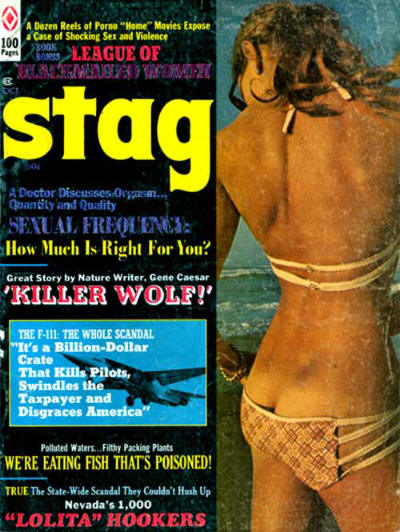 |
STAG for October, 1970. The genre had definitely changed by this point in history. Gone are those fabulous painted covers. In their stead is more cheesecake, pin-up photography. The sweats were trying to offer something similar to the bestselling PLAYBOY and PENTHOUSE magazines in terms of pictorials. The articles, as you can see, were still sensational. Purchased on eBay several years ago. |
Monday, June 3, 2013
JOURNEY TO SHERWOOD FOREST
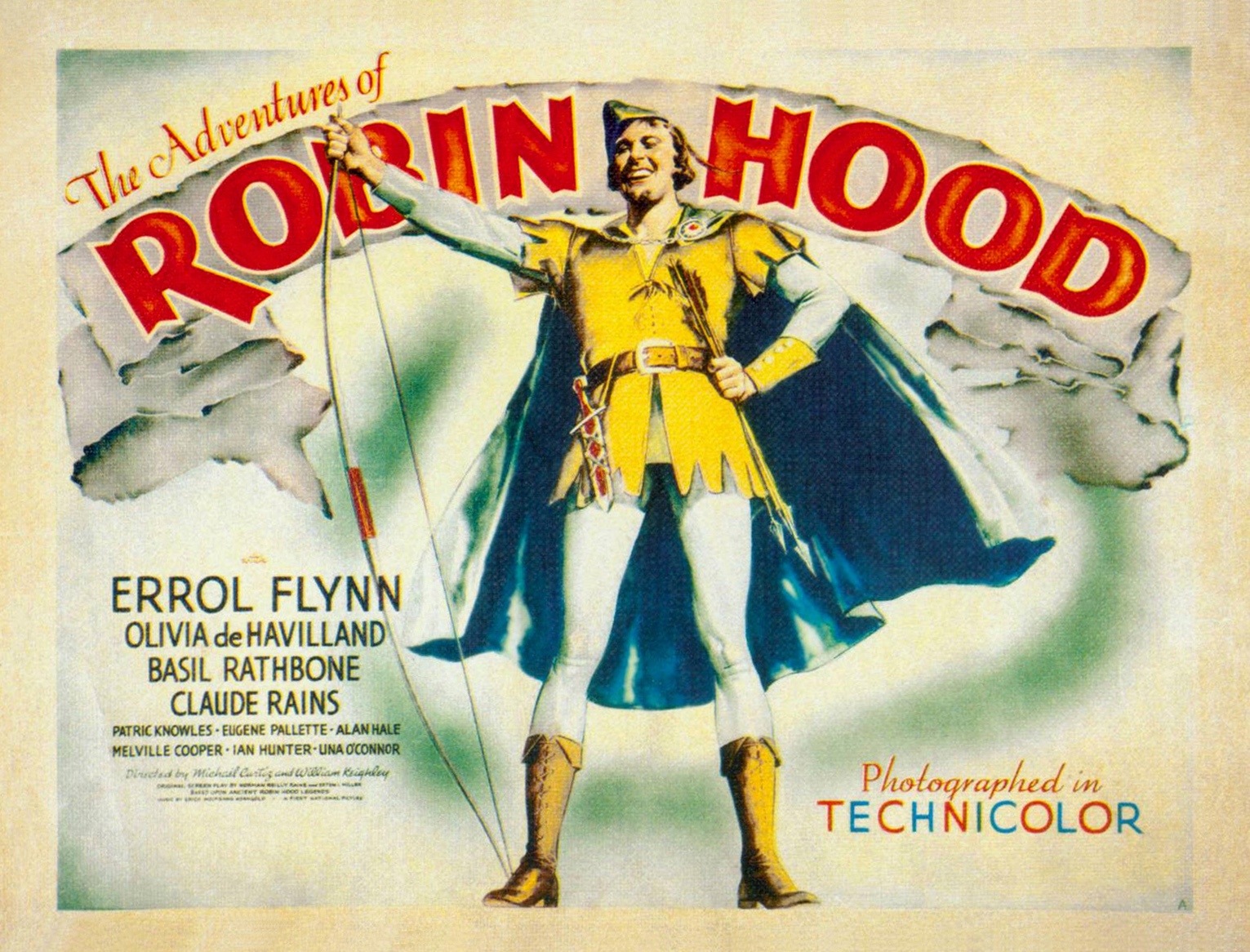 |
I had a great time introducing THE ADVENTURES OF ROBIN HOOD (1938) at the Paramount Theatre last night and I enjoyed the film immensely. It's corny. It's old-fashioned. But it's also extremely heroic, exciting, thrilling, colorful and romantic and I love it. I've now seen it twice on the big screen at the Paramount and many times in different home video formats including VHS and DVD. But my most memorable experience of this film remains the first time I ever saw it.
It was the early to mid 1970s. Austin's first comic book shop, the N.E. Mercantile Company, was located in the 1200 block of North Lamar, right next door to the legendary Terminix Pest Control Company and their iconic, giant bug outdoor advertising sign.
How many people (including myself and various buddies) contemplated heisting that giant bug over the years? N.E. Mercantile was owned and operated by Jay Knowles and the shop, which featured a variety of back issue comic books, fanzines, artwork, movie posters, paperbacks, etc. was a regular Saturday afternoon destination for me.
One summer, Jay decided to throw a pizza, beer and movie party at the store. It was by invitation only but all of the hardcore comic book and movie fans in Austin at the time were there. My neighbor, school classmate and fellow comic book collector Don Wallace and I attended the shindig together. There was pizza. There was a keg of Lone Star beer. And there was THE ADVENTURES OF ROBIN HOOD.
In those days, long before the advent of any home video medium, our opportunities for seeing classic films were somewhat limited. There was always television but we were at the mercy of station programmers as to what was shown and when. Remember, at that time, we had no way to record anything on television and watch it at a later date. The Paramount was in it's last incarnation as a first-run movie theater. The newly opened Dobie Theatre in Dobie Mall occasionally showed classics (I remember seeing both KING KONG and THEY DIED WITH THEIR BOOTS ON there). And of course, there was the University of Texas, where there were classic films shown somewhere on campus almost every night of the week per semester.
And then there were those few among us who owned actual 16mm prints of real, honest-to-gosh movies. One of these film collectors was a fellow named Bob Magnuson and he had quite a collection of films. He was the envy of many of us at the time. Imagine owning your own print of a classic movie and being able to watch it anytime you wanted. Sheer bliss!
It was Bob Magnuson who supplied the projector and the print of THE ADVENTURES OF ROBIN HOOD that long ago summer evening. Jay Knowles came through with the screen (a white sheet temporarily tacked to the wall), the pizza and the beer. Errol Flynn provided the wonder. Even though I've seen the film under many other circumstances over the years, that first viewing in a cramped back room of a comic book shop amid long boxes, cups of beer, slices of pizza and other admiring, awestruck fans, was truly magical. It's a night I'll never forget.
Watching THE ADVENTURES OF ROBIN HOOD again last night, I was struck by just how much Flynn's visual interpretation of Robin Hood  resembles this comic book character .jpg) And how much Basil Rathbone, as Sir Guy, 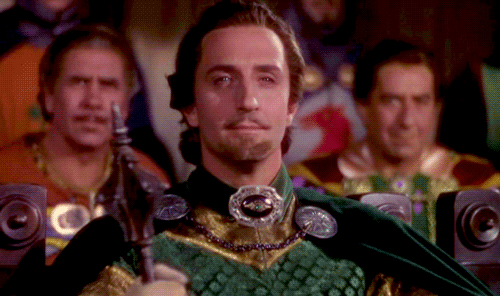 looks like this fella 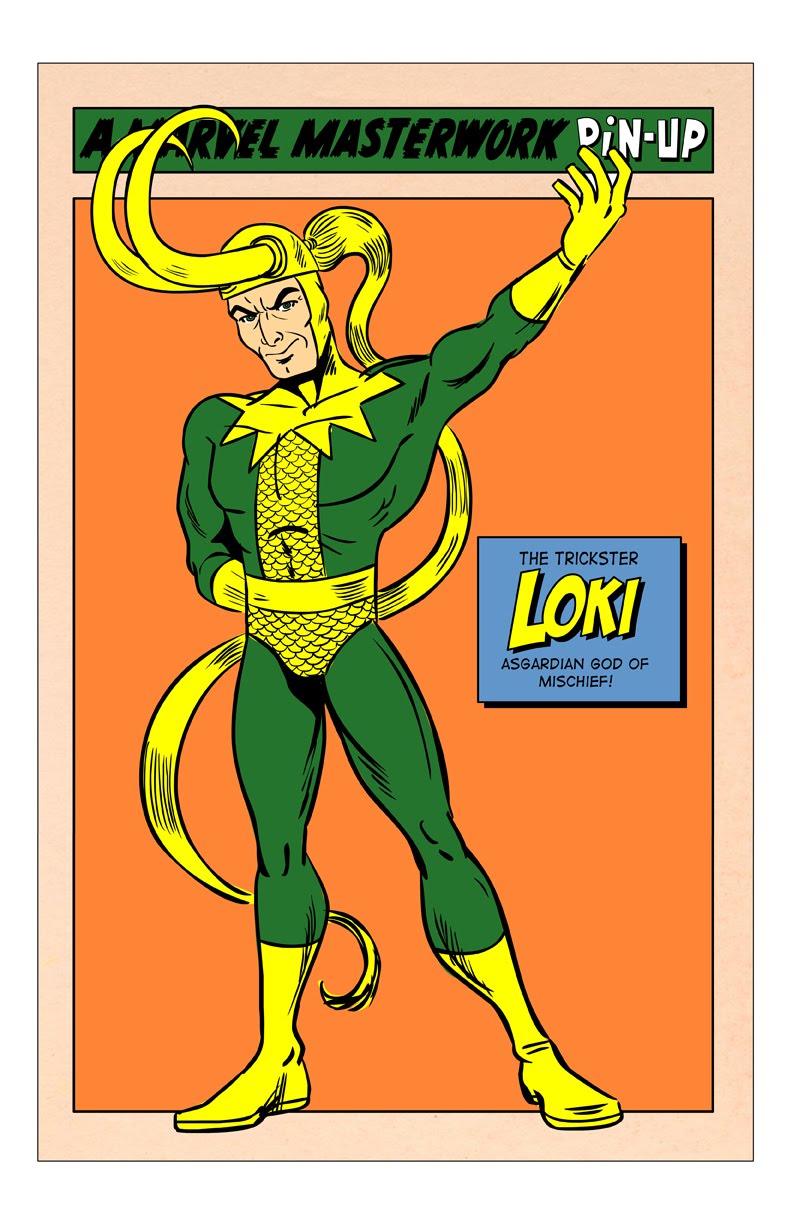 Fandral and Loki, were both originally created by Stan Lee and Jack Kirby and while I have no proof that either of them used THE ADVENTURES OF ROBIN HOOD as a direct reference for character visuals, I'm willing to bet that both Stan and Jack saw the film when they were young and those images must have stayed in their subconscious for many years. Finally, I was struck by the thought that the offspring of this woman 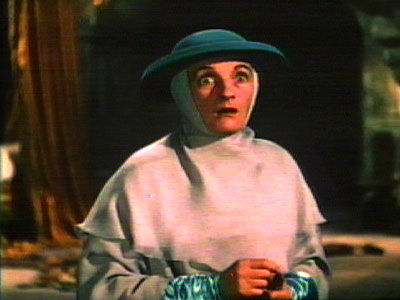 would look something like this  |
Saturday, June 1, 2013
THE ONE AND ONLY
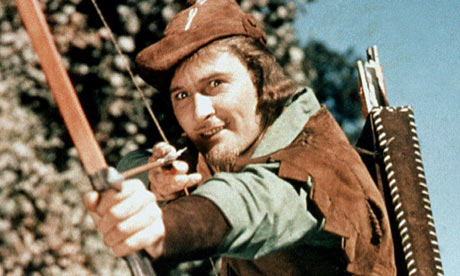 |
I'm scheduled to introduce THE ADVENTURES OF ROBIN HOOD (1938), tomorrow (Sunday) evening at the Paramount Theatre at 6:20 p.m. Come on down and see this magnificent film the way it was meant to be seen: on the big screen. Here are my film notes.
|
Robin Hood of Sherwood
Forest, he of the feathered cap, green costume, bow and arrow and “rob from the
rich, give to the poor” credo, ranks as one of the most enduring of all
fictional heroes, appearing in all sorts of media over the last one hundred
years or so. In addition to the original source material, the historical novel
by Sir Walter Scott, Robin Hood has appeared in print in dozens of other books
for both adults and children. He’s had several comic book series devoted to his
adventures and he served as a clear inspiration for at least two comic book superheroes:
DC’s Green Arrow and Marvel Comics’ Hawkeye. Countless toys, especially bows
and arrows, and other merchandise such as costumes and play sets have been
manufactured over the years. But it’s in the realm of film and television where
Robin has found his greatest fame.
2010’s big budget action/adventure Robin Hood, starring Russell Crowe, is
one of over sixty theatrically released films, eleven made-for-television
movies, one made-for-video feature and nine television series that have been
made either about Robin himself or using his name in the title. Space precludes
a complete listing of all of these productions but any discussion of Robin’s
cinematic career must begin with the Douglas Fairbanks silent swashbuckler Robin Hood (1922), which to date remains
the second greatest Robin Hood film ever made.
Other notable films include Robin and Marian (1976), Richard
Lester’s portrait of Robin and Marian as an older couple (played to perfection
by Sean Connery and Audrey Hepburn), Robin
and the 7 Hoods (1964), a modern updating of the legend starring Frank
Sinatra and the Rat Pack, Robin Hood: Men
in Tights (1993), a send-up of the genre courtesy of Mel Brooks and Kevin
Costner’s turn as the ace archer in Robin
Hood: Prince of Thieves (1991).
Robin Hood and his cohorts
were recast as animals in Walt Disney’s animated feature film Robin Hood (1973) but the best cartoon
version is far and away Robin Hood Daffy
(1958), a Warner Brothers Looney Tunes short starring Daffy Duck and Porky Pig.
On television, Richard Greene starred in The
Adventures of Robin Hood from 1955 to 1958 while Mel Brooks spoofed the
genre for the first time in the short lived When
Things Were Rotten (1975). As
durable a hero as Robin Hood has proven to be, it is certain that there will be
still more movies and television series produced about him and his legend for
years to come. Some of them may even be good but none will equal the film on
display here.
In The Adventures of Robin Hood,
Robin (Flynn) and his Merrie Men of Sherwood Forest make things difficult for
sly Prince John (Rains) and his evil henchman (Rathbone) while loyally waiting
for the noble King Richard (Hunter) to return from the Crusades and reclaim his
throne from his brother. Of course, Robin and his men take from the rich and
give the poor back the money Prince John had unfairly taxed them. That’s the
basic set-up for the greatest costume adventure film ever made.
Dashing Flynn and the
luminous de Havilland are as romantic a screen couple as Romeo and Juliet (they
even have a balcony scene). And the final sword-fight between Flynn and
Rathbone (who, in real-life was the superior swordsman) is a classic, complete
with gigantic shadows on castle walls, a visual signature of director Michael
Curtiz who took over directing duties during production from William Keighley.
The super-saturated look of
the three-strip Technicolor photography lends the proceedings a storybook look
and feel as do the sets, costumes and a rousing score by Erich Wolfgang
Korngold. These and all of the other production values are first rate and they
combine to transport viewers back to a truly enchanting world. As if that’s not
enough, the supporting cast is full of such veteran character actors as Alan
Hale (Little John), Eugene Pallette (Friar Tuck), Una O’Connor, Montagu Love
and Melville Cooper. The casting of Errol Flynn as Robin Hood was pivotal to
his career and reinforced his swashbuckling screen persona which was first
introduced in Captain Blood (1935).
These two films and the many that followed secured Flynn’s standing as a
cinematic champion of the downtrodden and a true Hollywood hero.
The Adventures of Robin Hood was nominated for Best Picture of the Year and won
Oscars for Best Film Editing, Best Original Score and Best Art Direction. The
Paramount Theatre is proud to present this glorious newly restored print of a
legendary film. Sit back, relax and enjoy. They don’t get any better than this.
